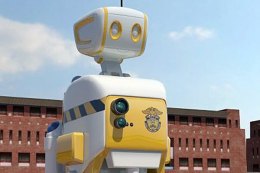
The prison guard robot prototype, developed by Lee Baik-chul, a professor at Kyonggi University, in Seoul, South Korea.
In prisons of the future, watchtowers and barbed wire may be just a formality. South Korea is debuting robot wardens with the power to stop jailbreaks. If all goes according to plan, these hulking bots will soon roam South Korean jails as troubleshooters.
The objective is more Minority Report than Terminator. The robots contain cameras and sensors that are programmed to detect unusual activity or mood shifts in prisoners. Standing nearly 5 ft. (152 cm) tall, the robots will trek around the prison grounds to check on inmates, providing backup and relief for the human guards. The four-wheelers are in touch with prisoners’ emotions, sensing aggressive or suicidal shifts, and they can even facilitate conversation with the human guards from afar using their built-in cameras. The three robots cost $863,000 to build, and their first trial will begin in March in a jail in Pohang, a coastal city in southeast South Korea.
(LIST: 10 Robots Inspired by Animals and Insects)
Despite their serious mission, the unwieldy robots — with their white shell and drooping oval eyes — have an unassuming, even amiable look about them, à la Casper the Friendly Ghost. That’s because the designers don’t intend for the robots to instill fear in the prisoners. “We are now working on refining its details to make it look more friendly to inmates,” Kyonggi University Professor Lee Baik-chul, who was in charge of the design process, told the Yonhap News Agency.
South Korea is a longtime leader in the robot revolution. In 2009, the nation started putting English-teaching robots in schools, and earlier robots were tested as guards on the North Korea border. As in any android influx, concerns may arise that automated beings will supplant human jobs, but Lee told the Wall Street Journal that prison wardens are welcoming the robots, particularly during undesirable night shifts.






